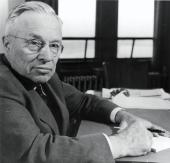

Gardiner, born November 30, 1883, on a farm near Farquhar, Ontario, was one of a legion of southern Ontarians who came west (in his case by harvest excursion in 1901) and left their political mark on the Canadian prairies. First elected in a provincial by-election in 1914, Gardiner spent two decades in office in Regina and, after entering Mackenzie King's Cabinet and later Louis St. Laurent's as Minister of Agriculture, another twenty-two years in Ottawa. Nonetheless, his heart remained rooted in agriculture. He bought his farm at Lemberg during World War I, and supervised its operation under his son or a close associate for more than four decades. When he was defeated in the general election of 1958, he returned to the farm, and it was there that he died January 2, 1962.
Gardiner's agrarian interests permeated his politics, most certainly during the unprecedented span in which he held one federal portfolio. The Prairie Farm Assistance Act (1939), which recognized federal government responsibility for the economic well-being of prairie grain farmers, proved to be the forerunner of a score of national agricultural initiatives with the same objective. The disruption to overseas markets caused by World War II demanded immediate and continuous adjustments in all areas of agriculture over all regions of Canada. Following the war, Mackenzie King announced that he would step down as leader of the Liberal Party of Canada. Gardiner sought but lost the leadership in 1948, coming second to St. Laurent.
Gardiner's reputation, established in Saskatchewan first as a backbencher, then Minister and finally as Premier, was as that of a relentless partisan who would brook no compromise. Following the cleavage in the Liberal Party over Union Government and conscription, events which saw Gardiner and a tiny minority of Liberals stand by Laurier and against the Military Service Act (1917), Gardiner took command of the Liberal Party organization in Saskatchewan and made it a near invincible electoral force. Between 1914 and 1958, Gardiner personally won every election contest he entered, except the last. The provincial party, between 1914 and the Co-operative Commonwealth Federation victory in 1944, won every election except that of 1929, although even then it won more seats and votes than any other party. In addition to its provincial prowess, Gardiner's organization saw that Mackenzie King won the federal seat of Prince Albert in a by-election in 1926 and that he kept that seat in five more contests until 1945. Prince Albert was the only seat in King's political career that he retained as an incumbent.
The Liberal Party organization under Gardiner entered the realm of myth as “the machine” largely due to an academic article written by Escott Reid. Reid's depiction downplayed the extent of popular participation by rank-and-file Liberals that made the organization so successful. In his capacity as Highways Minister and then as Premier, Gardiner stood at its head overseeing a platoon of government “inspectors” who, while on the public payroll, had the interests of the party as their priority. But the party required more than a leader to make it succeed, as its slow deterioration once Gardiner departed from Regina demonstrated.
Gardiner's administrative and organizational skills explain his electoral and departmental achievements. They did not contribute to an outstanding career in public policy, either as a provincial Cabinet Minister or as Premier. He succeeded Charles Dunning as Premier in 1926. Between then and the Liberals' defeat in 1929, the economy was good, and there were no decisions in which Gardiner had a hand that exercised long-term influence on the province. Similarly, after he led the Liberals back to power in 1934 (thereby becoming the only Saskatchewan Premier to hold the office twice), his eyes were on a federal Cabinet appointment. Except for undoing the Co-operative government's civil service reforms and disbanding its Relief Commission, in both instances handing power back to the politicians, where he believed it belonged, depression and drought limited any policy initiative Gardiner might have attempted.
The singular event of Gardiner's first ministry was the electoral defeat of 1929. That election saw the Ku Klux Klan play a determinative role in coalescing previously fragmented opposition to the Liberals. For the anti-Liberals, the major issue was the government's purportedly loose administration of the separate schools and excessive influence exercised by the Roman Catholic Church. Gardiner attempted to refute the charges with statistics and by appeals to tolerance for minorities. For the first time (and the last until 1999), a coalition, on this occasion composed of Conservatives, Progressives and Independents, formed a government under J.T.M. Anderson as Premier. In his long career Gardiner never willingly relinquished power; however, he maintained until the end of his life that the outcome of that contest was “an honourable defeat” and that the Liberal Party emerged the stronger for its electorally unpopular position.
David E. Smith